#microsoft fundamentals certification
Explore tagged Tumblr posts
Text
https://www.worldranklist.com/preview/bookmarking/496840/Best-az-900-certification-Scholarhat
You gain expertise in designing, organising, and scaling your web applications on Microsoft Azure with the help of the Microsoft Certified Azure Fundamentals Training Program. It includes training on the fundamental Azure services, the fundamental Azure solutions and management tools, the fundamental Azure network and general security features, the fundamental Azure identity, governance, privacy, and compliance features, and the fundamental Azure cost management and Service Level Agreements.
0 notes
Text
0 notes
Text

CloudThat is the world's leading training & Consulting services provider on Cloud, DevOps, Security, AI&ML, IoT, and Big Data for midsize and enterprise clients globally. 102, 4th B cross, KBH Colony, 5th Block, Koramangala, Industrial Area, Bengaluru, Karnataka 560095. [email protected] https://www.cloudthat.com/training/microsoftdynamics/exam-mb-910-microsoft-dynamics-365-fundamentals-customer-engagement-apps-crm
1 note
·
View note
Text
MICROSOFT AZURE FUNDAMENTALS AZ-900 (PART 2)
Consumption based models
Two types of expenses to consider
Capital Expenditure (CapEx)
Typically one time up front expenditure to purchase secure tangible resources
Example: repaying your parking lot, building data center
Operational Expenditure (OpEx)
Spending money on services or products over time.
Examples: Renting a convention center, lease a company vehicle, sign up for cloud services
Cloud computer is OpEx because it operations on a consumption based model.
You pay for the IT services you use
Benefits of a consumption based model
No upfront costs
No need to purchase and manage infrastructure that may not be used to its full potential
Ability to pay for more resource when they are needed
Ability to stop paying for resources that are no longer needed
No need to worry about planning (over estimating or under estimating for use of a data center)
This model helps you pay for your cost based on services you use
Plan and manage operating costs
Run your infrastructure more efficiently
Scale as your business needs change
Benefits of high availability and scalability in the cloud
Two biggest considerations when building or deploying a cloud application are: uptime(availability) and handling demand (scale)
High availability
Focuses on ensuring maximum availability, regardless of disruptions or events that may occur
When architecting the solution, account for service availability guarantees.
Azure is a height available cloud environment with uptime guarantees depending on the service (Part of the SLA agreement)
Service Level Agreement (SLA)
Formal agreement between customer and service provider.
Also used inside organizations between IT and business
Provided on uptime % ie 100% uptime
Also has downtime information and credits you may get then
100% uptime is expensive and hard. Thus 99% or 99.9% or 99.95% is common.
99% vs 99.99% has a difference.
99% down 1.6 hrs per week/7.2 per month
99.9% down 10 mins per week/43.2 per month
More expensive for higher availability
Scalability
Major benefit is the scalability of cloud computing
Scalability refers to the ability to adjust resources to meet demand
Another benefit, you are not over paying for services and only paying for what your using
Horizontal Scaling
adding or removing resources
Needing more CPUs or more RAM
Vertical Scaling
increase or decrease the capabilities of the resource
Needing more virtual machines or containers.
Reliability
Ability of a system to recover from failures and continue to function
Cloud is decentralized by design and supports reliable and resilient infrastructure
Even if one region has a catastrophic event, other regions can be up and operating
Predictability
Move forward with confidence
Performance predictability - Auto scaling, load balancing, and high availability
Cost predictability
Forecasting cloud spend
Use analytics to find patters in your use to allow for better planning of resource deployments
Can predict the Total Cost of ownership(TCO)
Pricing calculator to get an estimate of potential cloud spend
0 notes
Text
(New) Foundational C# on FreeCodeCamp!
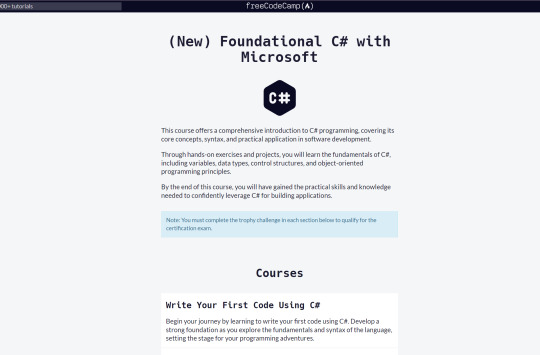
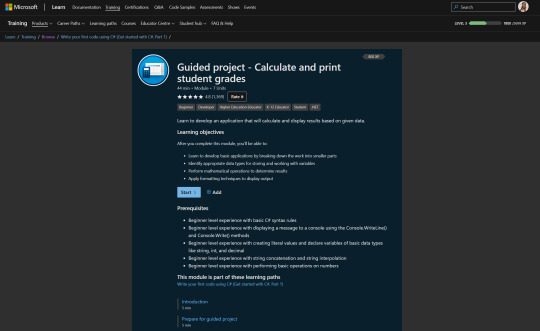
FreeCodeCamp recently release a brand new course where you learn the fundamentals of C#, working alongside with Microsoft Learn!
I had a go because I use C# at work anyways so wanted test what it teaches! This is what I gathered on how to do the course:
Complete the course on Microsoft Learn (FreeCodeCamp will link you to the various places in each lesson)
Come back to FreeCodeCamp to answer the questions to complete the lesson, then eventually complete the mini modules it has
After completing ALL of the necessary lessons on Microsoft Learn, then you will get a Trophy badge-thingy and it has a link attached to it - get that link
Run back to FreeCodeCamp for them to verify that you've done it all
Once done, you will get a certificate in which you can add anywhere!
I'm only explaining this because I was super confused about the instructions at first! (´・ω・`)
I believe you don't get a certificate from Microsoft Learn so by doing the course via FreeCodeCamp you can get one as proof of learning it!
I will definitely be doing it, I love my name on certificates~! Hope this helps someone else too! Happy coding!
#resources#codeblr#coding#progblr#programming#studyblr#studying#computer science#tech#freecodecamp#csharp#csharp programming#coding resources
79 notes
·
View notes
Text
Another exam passed!
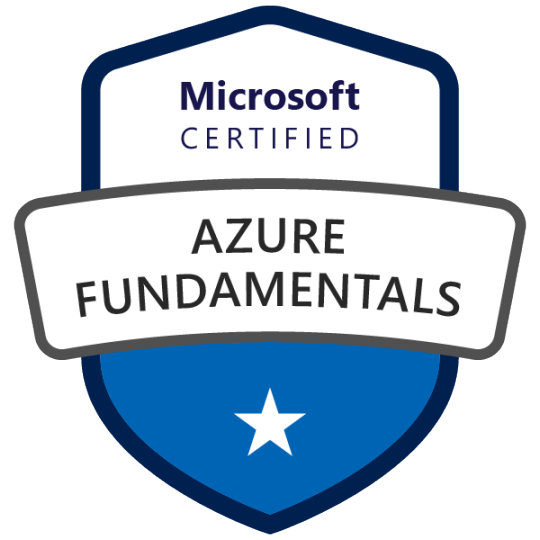
I've scored myself Microsoft's Azure Fundamentals (AZ-900) certification, and now I have a solid grasp on cloud computing. This will look great on my CV!
2 notes
·
View notes
Text
How to Become a Cloud Computing Engineer
Introduction:
Cloud computing has become a cornerstone of modern IT infrastructure, making the role of a Cloud Computing Engineer highly in demand. If you're looking to enter this field, here's a roadmap to help you get started:
Build a Strong Foundation in IT A solid understanding of computer networks, operating systems, and basic programming is essential. Consider getting a degree in Computer Science or Information Technology. Alternatively, Jetking offer you to make your career in Cloud computing Courses and gain the technical knowledge needed.
Learn Cloud Platforms Familiarize yourself with popular cloud service providers such as AWS (Amazon Web Services), Microsoft Azure, and Google Cloud. Many platforms offer certification courses, like AWS Certified Solutions Architect, which will help validate your skills.
Gain Hands-On Experience Practical experience is critical. Set up your own cloud projects, manage databases, configure servers, and practice deploying applications. This will give you the real-world experience that employers seek.
Master Programming Languages Learn programming languages commonly used in cloud environments, such as Python, Java, or Ruby. Scripting helps automate tasks, making your work as a cloud engineer more efficient.
Understand Security in the Cloud Security is paramount in cloud computing. Gain knowledge of cloud security best practices, such as encryption, data protection, and compliance standards to ensure safe operations and become Master in cloud computing courses.
Get Certified Earning cloud certifications from AWS, Azure, or Google Cloud can enhance your credibility. Certifications like AWS Certified Cloud Practitioner or Microsoft Certified: Azure Fundamentals can provide you a competitive edge.
Keep Learning Cloud technology evolves rapidly, so continuous learning is key. Stay updated by taking advanced courses and attending cloud tech conferences.
Join Jetking today! Click Here
By building your expertise in these areas, you’ll be well on your way to a successful career as a Cloud Computing Engineer!
2 notes
·
View notes
Text
Azure DevOps Training
Azure DevOps Training Programs

In today's rapidly evolving tech landscape, mastering Azure DevOps has become indispensable for organizations aiming to streamline their software development and delivery processes. As businesses increasingly migrate their operations to the cloud, the demand for skilled professionals proficient in Azure DevOps continues to soar. In this comprehensive guide, we'll delve into the significance of Azure DevOps training and explore the myriad benefits it offers to both individuals and enterprises.
Understanding Azure DevOps:
Before we delve into the realm of Azure DevOps training, let's first grasp the essence of Azure DevOps itself. Azure DevOps is a robust suite of tools offered by Microsoft Azure that facilitates collaboration, automation, and orchestration across the entire software development lifecycle. From planning and coding to building, testing, and deployment, Azure DevOps provides a unified platform for managing and executing diverse DevOps tasks seamlessly.
Why Azure DevOps Training Matters:
With Azure DevOps emerging as the cornerstone of modern DevOps practices, acquiring proficiency in this domain has become imperative for IT professionals seeking to stay ahead of the curve. Azure DevOps training equips individuals with the knowledge and skills necessary to leverage Microsoft Azure's suite of tools effectively. Whether you're a developer, IT administrator, or project manager, undergoing Azure DevOps training can significantly enhance your career prospects and empower you to drive innovation within your organization.
Key Components of Azure DevOps Training Programs:
Azure DevOps training programs are meticulously designed to cover a wide array of topics essential for mastering the intricacies of Azure DevOps. From basic concepts to advanced techniques, these programs encompass the following key components:
Azure DevOps Fundamentals: An in-depth introduction to Azure DevOps, including its core features, functionalities, and architecture.
Agile Methodologies: Understanding Agile principles and practices, and how they align with Azure DevOps for efficient project management and delivery.
Continuous Integration (CI): Learning to automate the process of integrating code changes into a shared repository, thereby enabling early detection of defects and ensuring software quality.
Continuous Deployment (CD): Exploring the principles of continuous deployment and mastering techniques for automating the deployment of applications to production environments.
Azure Pipelines: Harnessing the power of Azure Pipelines for building, testing, and deploying code across diverse platforms and environments.
Infrastructure as Code (IaC): Leveraging Infrastructure as Code principles to automate the provisioning and management of cloud resources using tools like Azure Resource Manager (ARM) templates.
Monitoring and Logging: Implementing robust monitoring and logging solutions to gain insights into application performance and troubleshoot issues effectively.
Security and Compliance: Understanding best practices for ensuring the security and compliance of Azure DevOps environments, including identity and access management, data protection, and regulatory compliance.
The Benefits of Azure DevOps Certification:
Obtaining Azure DevOps certification not only validates your expertise in Azure DevOps but also serves as a testament to your commitment to continuous learning and professional development. Azure DevOps certifications offered by Microsoft Azure are recognized globally and can open doors to exciting career opportunities in various domains, including cloud computing, software development, and DevOps engineering.
Conclusion:
In conclusion, Azure DevOps training is indispensable for IT professionals looking to enhance their skills and stay relevant in today's dynamic tech landscape. By undergoing comprehensive Azure DevOps training programs and obtaining relevant certifications, individuals can unlock a world of opportunities and propel their careers to new heights. Whether you're aiming to streamline your organization's software delivery processes or embark on a rewarding career journey, mastering Azure DevOps is undoubtedly a game-changer. So why wait? Start your Azure DevOps training journey today and pave the way for a brighter tomorrow.
5 notes
·
View notes
Text

Get a free ms certification voucher + extra certification resources!
I just found out about this yesterday!! This is happening on May 23rd (Tuesday), during the Microsoft Build 2023 event.
Register -> MS Build 2023 (Free Virtual Pass)
●~•────── Microsoft Free Certification ───────•~●
So Microsoft Build 2023 is hosting a number of cloud skills challenges and completing ANY of them will get you a free voucher for a Microsoft Certification exam. The challenges are learning modules, like a mini-course!
When you complete a challenge, the exam offer will valid between the end of June to end of September! So you can take time in the summer to get certified in something you're interested in!
More details here -> Microsoft Build Challenges
●~•────── Challenge Details ───────•~●
The challenge starts on May 23, 2023 at 4:00 PM (16:00) UTC and ends on June 20, 2023 at 4:00 PM (16:00) UTC.
There are 8 challenges available to choose from
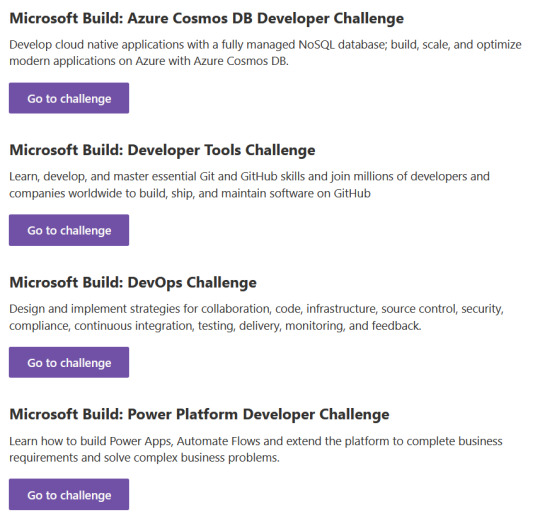

Each challenge is based on a collection of Microsoft Learn modules. If you complete your challenge before it ends, one free Microsoft Certification exam will be associated with your Microsoft Learn profile by June 30, 2023. You will be notified via email when it becomes available.
To see the full list of eligible exams please refer to the official rules page for more details.
●~•────── BONUS FUN FACT ───────•~●
You can also get free vouchers for fundamental certifications for Microsoft!! Just have to verify your student status.
More Details Here -> Free Microsoft Training & Certs for Students
●~•────── Are Certifications Worth it? ───────•~●
What do ya wanna do & where are you at? Here's my grain of salt:
If you're an intern /new grad level, then even a fundamentals cert can be great to show proactive learning & make you standout with recruitors
If you're switching to a new role or want a promotion, getting certifications seem to be a decent way to meet those qualifications, backed with some professional years of experience
Of course, the TYPE of certification matters a lot. Generally certs that are more challenging to complete, are considered "Expert" or "Professional" level will be more valuable.
Do diligent research into what your field of interest is looking for, and if a cert would be useful. (Read reddit, hackernews, watch yt vids, linkedin, etc)
Certs are not necessary (uhh when it comes to swe. flying a plane is a different story). But if you see it often in job descriptions that you're interested in, consider it! From my impressions, if you're interested in cloud engineering, AWS certs seem pretty valued.
Certs can also be a negative if you have too many with no specialization or experience. Certs are great to enhance ur resume, but make sure to emphasize relevant experience too!
If you have any experience with certifications, please do share your experience!
Learn more -> Certification Pathways for Microsoft
#codeblr#comp sci#tech#software engineering#tech events#certifications#microsoft build#computer science#studyblr
15 notes
·
View notes
Text
"Navigating the Cloud: Choosing the Best AZ-900 Training in Australia"
Introduction :
AZ900 certification will expand your career in today’s highly competitive business market, especially in cloud computing. Because it provides a strong base for cloud services and Microsoft Azure services, the Microsoft Azure basics AZ-900 certification is in high demand.
This will definitely help in choosing an Australian training program, making sure that we get the guidance and support we need to pass the process.
Understanding the "AZ900 Certification":
Those who wish to prove that they comprehend cloud ideas, core Azure services, Azure pricing, SLA, and lifecycle are intended to take the AZ-900 certification. This certification offers a strong basis for additional education and professional progression within the Azure ecosystem, and it also acts as a bridge to other, more specialized Azure credentials.

Why AZ-900 Certification Is Important
Validation of Azure Fundamentals:
Earning the AZ-900 certification validates your expertise in Azure services and core cloud principles, making you a valuable asset to any enterprise that uses Azure
Career advancement:
Getting licensed with AZ-900 allows you to consciousness on learning about cloud technology. This can result in new task opportunities and assist you pass ahead on your profession. Employers see AZ-900 certification as a signal of your capabilities and readiness to work with Azure technology, making you a desirable candidate for jobs.
Selecting Australia's Top AZ-900 Training Program:
When choosing an AZ-900 training course, it is important to consider several factors to ensure you receive the best instruction and support to match your learning needs:
Accreditation: Look for trainers who are accredited by Microsoft and have a history of excellent training courses.
Course topics: Ensure that the syllabus fully addresses each topic included in the AZ-900 exam objectives by observation.
Instructor Expertise: Make sure to check the qualifications and experience of the instructors who are teaching the course. This ensures they have the necessary skills and knowledge to teach the subject effectively.
Delivery Format: Consider how you prefer to learn and choose a course that offers different ways of learning. This could include live virtual sessions, online self-paced learning, or in-person classes.
Essential Components of the Top AZ-900 Training Program:
Broad Curriculum: The top AZ-900 training program will thoroughly cover every exam goal and give you a strong foundation in Azure principles.
Practical Labs: Engaging laboratories and tasks enable you to utilize theoretical understanding in practical situations, strengthening your education and enhancing your abilities.
Proficiency in Teaching: Throughout the course, knowledgeable instructors with a background in the business offer insightful commentary and practical advice, facilitating your understanding of challenging ideas.
Choice of Flexible Learning Options: Choose a training program that gives you the freedom to practice whenever it is most convenient for you.
Exam preparation: To help you feel confident and well prepared on exam day, we’ve armed you with effective resources, including practice tests and exam tips.

Advantages of Gaining AZ-900 Certification
Professional Prospects:
Holding the AZ-900 certification gives you access to various levels of cloud computing including Azure Developer, Cloud Administrator and Cloud Solution Architect
Potential Salary:
Due to the increased value and demand of their talents in the labor market, certified professionals frequently command higher pay than their non-certified counterparts.
Professional Development:
By showcasing your dedication to ongoing observe and certification, you undertaking to capability employers which you are a lifelong learner.
Opportunities for Networking:
becoming a Certified Azure Professional provides access to many resources and networking opportunities for professional development.
In conclusion,
For anyone looking to start or buy an existing cloud computing company, it’s worth the investment to get AZ-900 certified. You can choose a top AZ-900 training course in Australia and be confident of receiving the great advice and support you need to pass your certification program.

FAQs
Questions Frequently Asked About Our Training Services:
What aspects of cloud computing do you teach?
The definition, traits, deployment patterns, and service models of cloud computing are among the core ideas and concepts that we instruct students in.
Which advantages of utilizing cloud services are included in your training, and how can one obtain them?
Absolutely, throughout our training sessions, we go over the many advantages of employing cloud services, including scalability, cost-effectiveness, flexibility, and improved security.
Could you provide more details on the kinds of cloud services you instruct?
Sure, please respond.We cover the abilities and usage problems of diverse cloud services, including infrastructure as a provider (IaaS), platform as a provider (PaaS), and software as a carrier (SaaS).
Which fundamental Azure architectural elements are covered in your training?
In order to give students a thorough grasp of Azure architecture, our course covers the fundamental architectural elements of Azure, such as regions, availability zones, resource groups, and Azure subscriptions.
Do you offer instruction on networking and computing services offered by Azure?
Yes, we provide thorough training on Azure networking services including Azure VPN Gateway, Azure Load Balancer, and Virtual Network (VNet), as well as Azure compute services like virtual machines, Azure App Service, and Azure Kubernetes Service (AKS).
How about the storage services offered by Azure? Do you cover these in your training?
In response, yes. We cover each element of Azure garage offerings, which includes Azure Blob Storage, Azure Files, Azure Queue Storage, and Azure Table Storage, in detail during our session.
In your training, how do you cover Azure identity, access, and security topics?
To make certain a sturdy emphasis on security quality practices, we provide in-depth training on Azure identification and get admission to management. Topics protected include Azure Active Directory (AAD), role-based totally get right of entry to manipulate (RBAC), Multi-Factor Authentication (MFA), and Azure Security Center.
Could you elaborate on how your training covers cost management in Azure?
Sure, possibly respond. In order to assist businesses optimize their return on investment while reducing expenses, we train efficient cost management strategies in Azure, such as Azure Cost Management+ Billing, budgeting, resource tagging, and optimization techniques.
Which Azure governance and compliance features and tools are addressed in your training?
In order to make certain compliance with regulatory requirements, our training covers a whole lot of Azure governance and compliance abilities and technology, together with Azure Policy, Azure Blueprints, Azure Security Center, and compliance certifications like GDPR and HIPAA.
Do you offer instructions on the tools and functionalities used to deploy and manage Azure resources?
In-depth training on Azure useful resource management and deployment abilities and tools, which includes Azure Resource Manager (ARM), Azure PowerShell, Azure CLI, Azure DevOps, and Infrastructure as Code (IaC) standards, is to be had upon request.
In your training, which Azure monitoring tools are covered and in what way are they addressed?
In order to offer insights into the general performance, availability, and security of Azure assets, we address a number of Azure tracking gear, together with Azure Monitor, Azure Log Analytics, Azure Application Insights, and Azure Security Center.
2 notes
·
View notes
Text
Your ability to design, plan, and scale your web applications on Microsoft Azure is enhanced through the Microsoft Certified Azure Fundamentals Training Program. It contains instruction on the fundamental Azure services, fundamental Azure solutions, fundamental Azure administration tools, fundamental Azure network security features, fundamental Azure identity, governance, and privacy features, and fundamental Azure cost management and Service Level Agreements.
0 notes
Text
youtube
#az900#azure fundamentals#certification#technology#azure#youtube#microsoft#azure devops#microsoft azure#Youtube
0 notes
Text
How To Get An Online Internship In the IT Sector (Skills And Tips)

Internships provide invaluable opportunities to gain practical skills, build professional networks, and get your foot in the door with top tech companies.
With remote tech internships exploding in IT, online internships are now more accessible than ever. Whether a college student or career changer seeking hands-on IT experience, virtual internships allow you to work from anywhere.
However, competition can be fierce, and simply applying is often insufficient. Follow this comprehensive guide to develop the right technical abilities.
After reading this, you can effectively showcase your potential, and maximize your chances of securing a remote tech internship.
Understand In-Demand IT Skills
The first step is gaining a solid grasp of the most in-demand technical and soft skills. While specific requirements vary by company and role, these competencies form a strong foundation:
Technical Skills:
Proficiency in programming languages like Python, JavaScript, Java, and C++
Experience with front-end frameworks like React, Angular, and Vue.js
Back-end development skills - APIs, microservices, SQL databases Cloud platforms such as AWS, Azure, Google Cloud
IT infrastructure skills - servers, networks, security
Data science abilities like SQL, R, Python
Web development and design
Mobile app development - Android, iOS, hybrid
Soft Skills:
Communication and collaboration
Analytical thinking and problem-solving
Leadership and teamwork
Creativity and innovation
Fast learning ability
Detail and deadline-oriented
Flexibility and adaptability
Obtain Relevant Credentials
While hands-on skills hold more weight, relevant academic credentials and professional IT certifications can strengthen your profile. Consider pursuing:
Bachelor’s degree in Computer Science, IT, or related engineering fields
Internship-specific courses teaching technical and soft skills
Certificates like CompTIA, AWS, Cisco, Microsoft, Google, etc.
Accredited boot camp programs focusing on applied skills
MOOCs to build expertise in trending technologies like AI/ML, cybersecurity
Open source contributions on GitHub to demonstrate coding skills
The right credentials display a work ethic and supplement practical abilities gained through projects.
Build An Impressive Project Portfolio
Nothing showcases skills better than real-world examples of your work. Develop a portfolio of strong coding, design, and analytical projects related to your target internship field.
Mobile apps - publish on app stores or use GitHub project pages
Websites - deploy online via hosting services
Data science - showcase Jupyter notebooks, visualizations
Open source code - contribute to public projects on GitHub
Technical writing - blog posts explaining key concepts
Automation and scripts - record demo videos
Choose projects demonstrating both breadth and depth. Align them to skills required for your desired internship roles.
Master Technical Interview Skills
IT internship interviews often include challenging technical questions and assessments. Be prepared to:
Explain your code and projects clearly. Review them beforehand.
Discuss concepts related to key technologies on your resume. Ramp up on fundamentals.
Solve coding challenges focused on algorithms, data structures, etc. Practice online judges like LeetCode.
Address system design and analytical problems. Read case interview guides.
Show communication and collaboration skills through pair programming tests.
Ask smart, well-researched questions about the company’s tech stack, projects, etc.
Schedule dedicated time for technical interview practice daily. Learn to think aloud while coding and get feedback from peers.
Show Passion and Curiosity
Beyond raw skills, demonstrating genuine passion and curiosity for technology goes a long way.
Take online courses and certifications beyond the college curriculum
Build side projects and engage in hackathons for self-learning
Stay updated on industry news, trends, and innovations
Be active on forums like StackOverflow to exchange knowledge
Attend tech events and conferences
Participate in groups like coding clubs and prior internship programs
Follow tech leaders on social mediaListen to tech podcasts while commuting
Show interest in the company’s mission, products, and culture
This passion shines through in interviews and applications, distinguishing you from other candidates.
Promote Your Personal Brand
In the digital age, your online presence and personal brand are make-or-break. Craft a strong brand image across:
LinkedIn profile - showcase achievements, skills, recommendations
GitHub - displays coding activity and quality through clean repositories
Portfolio website - highlight projects and share valuable content
Social media - post career updates and useful insights, but avoid oversharing
Blogs/videos - demonstrate communication abilities and thought leadership
Online communities - actively engage and build relationships
Ensure your profiles are professional and consistent. Let your technical abilities and potential speak for themselves.
Optimize Your Internship Applications
Applying isn’t enough. You must optimize your internship applications to get a reply:
Ensure you apply to openings that strongly match your profile Customize your resume and cover letters using keywords in the job description
Speak to skills gained from coursework, online learning, and personal projects
Quantify achievements rather than just listing responsibilities
Emphasize passion for technology and fast learning abilities
Ask insightful questions that show business understanding
Follow up respectfully if you don’t hear back in 1-2 weeks
Show interest in full-time conversion early and often
Apply early since competitive openings close quickly
Leverage referrals from your network if possible
This is how you do apply meaningfully. If you want a good internship, focus on the quality of applications. The hard work will pay off.
Succeed in Your Remote Internship
The hard work pays off when you secure that long-awaited internship! Continue standing out through the actual internship by:
Over Communicating in remote settings - proactively collaborate
Asking smart questions and owning your learning
Finding mentors and building connections remotely
Absorbing constructive criticism with maturity
Shipping quality work on or before deadlines
Clarifying expectations frequently
Going above and beyond prescribed responsibilities sometimes
Getting regular feedback and asking for more work
Leaving with letters of recommendation and job referrals
When you follow these tips, you are sure to succeed in your remote internship. Remember, soft skills can get you long ahead in the company, sometimes core skills can’t.
Conclusion
With careful preparation, tenacity, and a passion for technology, you will be able to get internships jobs in USA that suit your needs in the thriving IT sector.
Use this guide to build the right skills, create an impressive personal brand, ace the applications, and excel in your internship.
Additionally, you can browse some good job portals. For instance, GrandSiren can help you get remote tech internships. The portal has the best internship jobs in India and USA you’ll find. The investment will pay dividends throughout your career in this digital age. Wishing you the best of luck! Let me know in the comments about your internship hunt journey.
#itjobs#internship opportunities#internships#interns#entryleveljobs#gradsiren#opportunities#jobsearch#careeropportunities#jobseekers#ineffable interns#jobs#employment#career
4 notes
·
View notes
Text
Microsoft Azure Fundamentals AZ-900 (Part 1)
I recently took on the challenge of applying myself to pass the Azure Fundamentals AZ-900 exam. Every day on a daily basis I work with Azure and AWS, but I had never felt the need to pursue these certifications.
Over the last two weeks I reviewed the Microsoft Learning content for the Azure Fundamentals certification and recently passed it on my first attempt.
Below are the notes I had captured that helped me. Hopefully it can help you as well. Even if one person finds these valuable, then I will be happy that I shared them. :)
The content from my notes will be shared across several posts.
Cloud computing
Power and features to run your software
PC is in the cloud provider data center vs you
Pay for services you use
Others manage up keep of computer
Basic services are compute and storage
Compute power
How much processing your computer may do
Pay for resources you use
Storage
Volume of data you can store on your computer
Over time you need more, here you can request more
They make backups and ensure your system is up to date.
Shared responsibility model
Responsibilities are shared between the cloud provider and the consumer
Cloud provider: physical security, power, cooling, network connectivity
Consumer: data and information stored in cloud, access security
Mixed: example SQL server, the provider is responsible for the sql server, but the customer is responsible for the data
Different Models
IaaS - Infrastructure as a service
Consumer: Most responsibility
Provider: responsible for basics: physical security, power, connectivity, etc.
PaaS - Platform as a service
Middle ground
SaaS - Software as a service
Consumer: access, data, etc.
Provider: Most responsibility
Consumer is always responsible for
Information and data
Devices that are allowed to connect to your cloud
The accounts and identities of the people, services, and devices within the organization
Cloud provider is always responsible for
Physical data center
Physical network
Physical hosts
Your service model will determine responsibility for things like
Operating system
Network controls
Applications
Identity and infrastructure
Define Cloud models
Private Cloud
Similar to a traditional data center
Delivers services to a single entity
Greater control for the company of its IT department
More expensive and fewer benefits of a public cloud
Can be hosted at your on-site datacenter or at a third party facility
Public Cloud
Built, controlled, and maintained by a third party provider
Anyone that wants to purchase services can purchase them
Hybrid Cloud
An environment that uses both public and private clouds in an inter-connected environment.
Hybrid cloud environments can be used to allow private cloud to surge for increased temporary demand by deploying public cloud resources
Can provide an extra layer of security
Multi-cloud
Use of multiple public cloud providers
Use of different features at each provider
Starting your cloud journey with one provider and then migrating later
You manage resources and security in two environments
0 notes
Text
Microsoft Azure Fundamentals
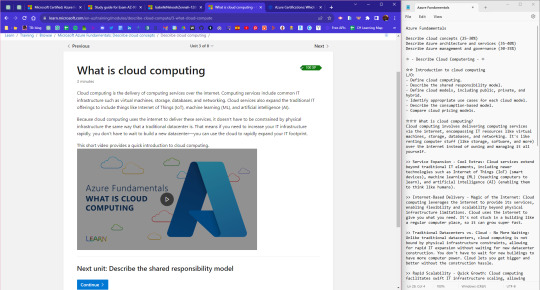
Thursday 17th august 2023
Dad has got me trying to get the Microsoft Azure Fundamentals certification! If you know me, I love my name on certificates so I am trying it out! I haven't been too much into cloud computing so I guess this is a good opportunity to actually learn and see what it's all about.
I know the bare basics that it's storing things not at the company?? Like at work, they store everything in Azure. Again, I may be wrong with the definition - that's why I'm learning!
Learning new things can be fun! ˙˚ʚ(´◡`)ɞ˚˙
#xc: studies#azure studies#codeblr#coding#progblr#programming#studyblr#studying#computer science#microsoft azure#azure certification#tech#cloud computing
31 notes
·
View notes
Text
How To Get An Online Internship In the IT Sector (Skills And Tips)

Internships provide invaluable opportunities to gain practical skills, build professional networks, and get your foot in the door with top tech companies.
With remote tech internships exploding in IT, online internships are now more accessible than ever. Whether a college student or career changer seeking hands-on IT experience, virtual internships allow you to work from anywhere.
However, competition can be fierce, and simply applying is often insufficient. Follow this comprehensive guide to develop the right technical abilities.
After reading this, you can effectively showcase your potential, and maximize your chances of securing a remote tech internship.
Understand In-Demand IT Skills
The first step is gaining a solid grasp of the most in-demand technical and soft skills. While specific requirements vary by company and role, these competencies form a strong foundation:
Technical Skills:
>> Proficiency in programming languages like Python, JavaScript, Java, and C++ >> Experience with front-end frameworks like React, Angular, and Vue.js >> Back-end development skills - APIs, microservices, SQL databases >> Cloud platforms such as AWS, Azure, Google Cloud >> IT infrastructure skills - servers, networks, security >> Data science abilities like SQL, R, Python >> Web development and design >> Mobile app development - Android, iOS, hybrid
Soft Skills:
>> Communication and collaboration >> Analytical thinking and problem-solving >> Leadership and teamwork >> Creativity and innovation >> Fast learning ability >> Detail and deadline-oriented >> Flexibility and adaptability
Obtain Relevant Credentials
While hands-on skills hold more weight, relevant academic credentials and professional IT certifications can strengthen your profile. Consider pursuing:
>> Bachelor’s degree in Computer Science, IT, or related engineering fields. >> Internship-specific courses teaching technical and soft skills. >> Certificates like CompTIA, AWS, Cisco, Microsoft, Google, etc. >> Accredited boot camp programs focusing on applied skills. >> MOOCs to build expertise in trending technologies like AI/ML, cybersecurity. >> Open source contributions on GitHub to demonstrate coding skills.
The right credentials display a work ethic and supplement practical abilities gained through projects.
Build An Impressive Project Portfolio
Nothing showcases skills better than real-world examples of your work. Develop a portfolio of strong coding, design, and analytical projects related to your target internship field.
>> Mobile apps - publish on app stores or use GitHub project pages >> Websites - deploy online via hosting services >> Data science - showcase Jupyter notebooks, visualizations >> Open source code - contribute to public projects on GitHub >> Technical writing - blog posts explaining key concepts >> Automation and scripts - record demo videos
Choose projects demonstrating both breadth and depth. Align them to skills required for your desired internship roles.
Master Technical Interview Skills
IT internship interviews often include challenging technical questions and assessments. Be prepared to:
>> Explain your code and projects clearly. Review them beforehand. >> Discuss concepts related to key technologies on your resume. Ramp up on fundamentals. >> Solve coding challenges focused on algorithms, data structures, etc. Practice online judges like LeetCode. >> Address system design and analytical problems. Read case interview guides. >> Show communication and collaboration skills through pair programming tests. >> Ask smart, well-researched questions about the company’s tech stack, projects, etc.
Schedule dedicated time for technical interview practice daily. Learn to think aloud while coding and get feedback from peers.
Show Passion and Curiosity
Beyond raw skills, demonstrating genuine passion and curiosity for technology goes a long way.
>> Take online courses and certifications beyond the college curriculum >> Build side projects and engage in hackathons for self-learning >> Stay updated on industry news, trends, and innovations >> Be active on forums like StackOverflow to exchange knowledge >> Attend tech events and conferences >> Participate in groups like coding clubs and prior internship programs >> Follow tech leaders on social media >> Listen to tech podcasts while commuting >> Show interest in the company’s mission, products, and culture
This passion shines through in interviews and applications, distinguishing you from other candidates.
Promote Your Personal Brand
In the digital age, your online presence and personal brand are make-or-break. Craft a strong brand image across:
>> LinkedIn profile - showcase achievements, skills, recommendations >> GitHub - displays coding activity and quality through clean repositories >> Portfolio website - highlight projects and share valuable content >> Social media - post career updates and useful insights, but avoid oversharing >> Blogs/videos - demonstrate communication abilities and thought leadership >> Online communities - actively engage and build relationships
Ensure your profiles are professional and consistent. Let your technical abilities and potential speak for themselves.
Optimize Your Internship Applications
Applying isn’t enough. You must optimize your internship applications to get a reply:
>> Ensure you apply to openings that strongly match your profile >> Customize your resume and cover letters using keywords in the job description >> Speak to skills gained from coursework, online learning, and personal projects >> Quantify achievements rather than just listing responsibilities >> Emphasize passion for technology and fast learning abilities >> Ask insightful questions that show business understanding >> Follow up respectfully if you don’t hear back in 1-2 weeks >> Show interest in full-time conversion early and often >> Apply early since competitive openings close quickly >> Leverage referrals from your network if possible
This is how you do apply meaningfully. If you want a good internship, focus on the quality of applications. The hard work will pay off.
Succeed in Your Remote Internship
The hard work pays off when you secure that long-awaited internship! Continue standing out through the actual internship by:
>> Over Communicating in remote settings - proactively collaborate >> Asking smart questions and owning your learning >> Finding mentors and building connections remotely >> Absorbing constructive criticism with maturity >> Shipping quality work on or before deadlines >> Clarifying expectations frequently >> Going above and beyond prescribed responsibilities sometimes >> Getting regular feedback and asking for more work >> Leaving with letters of recommendation and job referrals
When you follow these tips, you are sure to succeed in your remote internship. Remember, soft skills can get you long ahead in the company, sometimes core skills can’t.
Conclusion
With careful preparation, tenacity, and a passion for technology, you will be able to get internships jobs in USA that suit your needs in the thriving IT sector.
Use this guide to build the right skills, create an impressive personal brand, ace the applications, and excel in your internship.
Additionally, you can browse some good job portals. For instance, GrandSiren can help you get remote tech internships. The portal has the best internship jobs in India and USA you’ll find.
The investment will pay dividends throughout your career in this digital age. Wishing you the best of luck! Let me know in the comments about your internship hunt journey.
#internship#internshipopportunity#it job opportunities#it jobs#IT internships#jobseekers#jobsearch#entryleveljobs#employment#gradsiren#graduation#computer science#technology#engineering#innovation#information technology#remote jobs#remote work#IT Remote jobs
5 notes
·
View notes